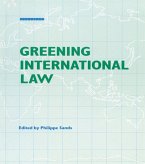This book is a comprehensive examination of the key issues, institutions and ideologies in this area, presenting definitions and explanations of the fundamentals of intellectual property rights (IPRs), biogenetic resources and traditional knowledge. It uses the insights from this to build a picture of how these factors interact in practice, bringing to the surface issues such as: the conservation and sustainable use of biodiversity, benefit sharing from the commercial use of biodiversity, biotechnological innovation and the transfer of technology, agriculture, food security, rural development, health and international justice.
Part 1 describes the relevant international IPR laws, highlights the extent to which modern commerce depends on such resources, and traces the way in which modern IPR law has evolved to accommodate this dependence. Part 2 shows how stronger IPR protection in the area of life science innovation has given rise to controversies such as 'biopiracy', 'terminator' genes and genetic uniformity. Part 3 focuses on traditional knowledge, its nature, its importance, and the applicability of IPR-style protection. Part 4 covers the international negotiation and policy-making of the WTO, WIPO and CBD and the legislative initiatives of national governments of Asia, Africa and Latin America. Finally, Part 5 focuses on two developing country case studies - of India and Kenya - assessing whether they will be able to gain economic benefit from development of their natural resources within the current regulatory system and whether this will encourage the conservation and sustainable use of the resource base.
With its multidisciplinary approach and breadth of coverage, this book will appeal both to those new to the subject and to those with professional and specialist interest, including students, academics, legal practitioners, government policy-makers and the private sector.
Dieser Download kann aus rechtlichen Gründen nur mit Rechnungsadresse in A, B, BG, CY, CZ, D, DK, EW, E, FIN, F, GR, HR, H, IRL, I, LT, L, LR, M, NL, PL, P, R, S, SLO, SK ausgeliefert werden.
Hinweis: Dieser Artikel kann nur an eine deutsche Lieferadresse ausgeliefert werden.









